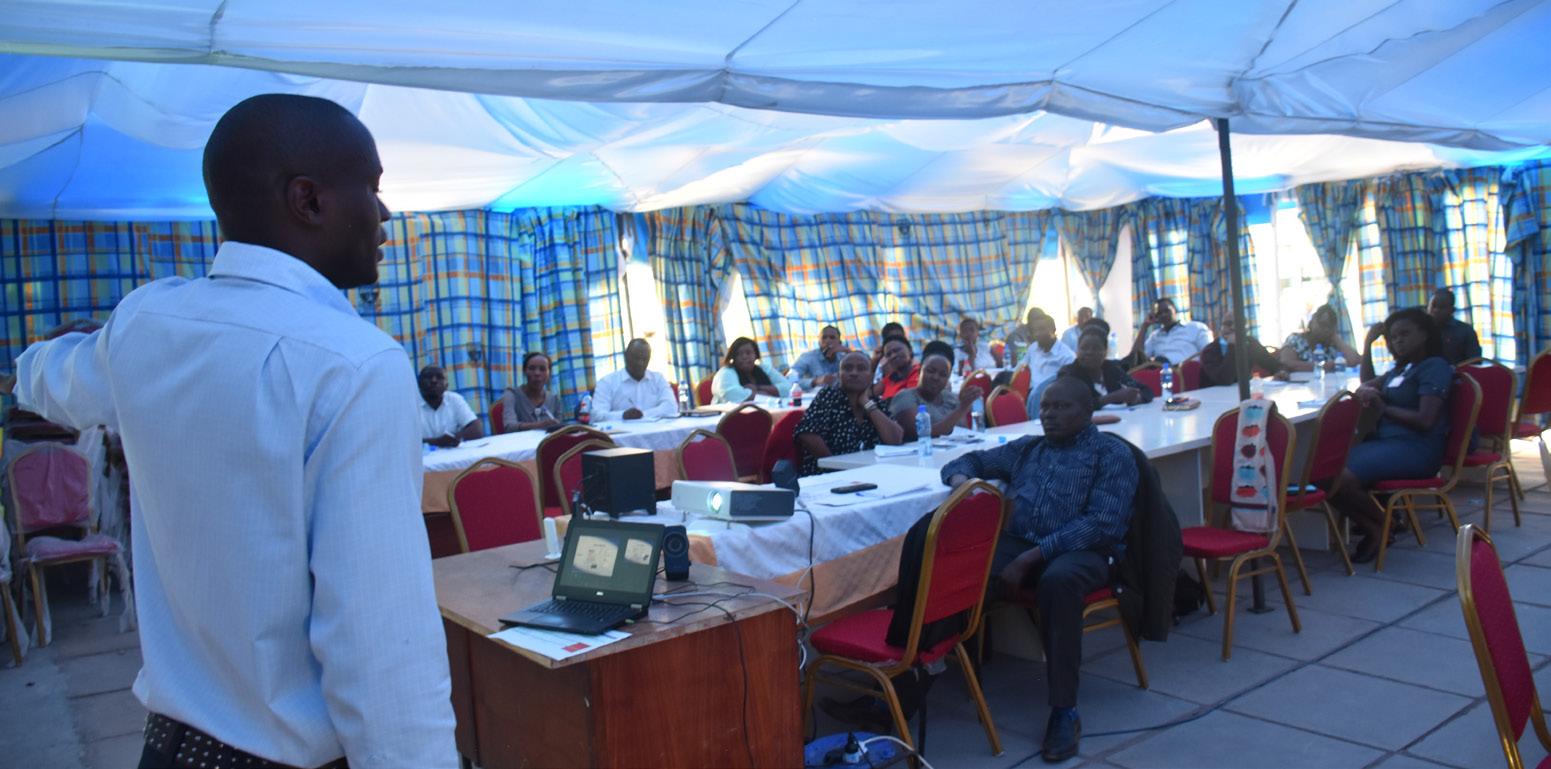
4 minute read
KNH sharpens staff skills in CBRN management
By Edel Q. Mwende
Advertisement
In the wake of catastrophes that occur in our ever-changing world, it is vital for individuals and institutions to be ready to respond appropriately.
The level 6 National Referral Hospitals have critical ingredients that can be used to prepare weapons of mass destruction (CBRN) for example the reagents in laboratories, KEPI cold chains for vaccines,
Radiation departments, Academic and research departments, oncology for Cancer Treatment Centers and chemical agents used for sterilization (chlorine). The hospitals also have a large group of unprofiled medical students who may be used by terror group as insiders to get access of the hospital and reagents to pose a risk of being attacked. These institutions may receive casualties from disaster sites who are either contaminated by CBRN materials which again may course contamination of all hospital and human resources leading to a lockdown of the facility.
Kenyatta National Hospital, being at the apex of health care in the country has therefore introduced “KNH Basic Course on emergency response to Chemical, Biological, Radiological and Nuclear (CBRN) incidents for health workers.”
The course is available at the new KNH Training and Research Centre with the first cohort receiving intense five (5)-day class-based training (October 17th to 24th, 2022). The cohort comprised forty-one (41) staff from various clinical and nonclinical departments in KNH.
Spearheaded by the KNH Disaster Management Unit in collaboration with the National Disaster Management Unit (NDMU) and the Government Chemist Department, the training is geared at building the capacity of health workers to respond to CBRN exposures and provide the best patient care for exposed patients and themselves.
“The ten (10) modular training program helps participants recognize and respond swiftly to CBRN incidences and makes use of various case studies, interactive table-top exercises, timed online quizzes, practical group exercises, simulations and presentations in order to build adequate knowledge for effective response,” said Ms. Poline Njue, CBRN champion and Assistant Chief Nurse.
NDMU trainer and CBRN expert, Mr. David Makan emphasized on the importance of the four (4) strategies for the prevention of intentional CBRN disasters: “We have to Prepare, Protect, Prevent and Pursue.”
The Government Chemist Department trainer and CBRN expert, Mr. Douglas Keter enlightened the cohort on the international and national efforts in countering CBRN threats such as through the UN Security Council Resolution 1540, Chemical Weapons Convention (CWC), Biological Weapons Convention (BWC), Biological Weapons and Toxins Convention (BWTC), Nuclear Proliferation Treaty (NPT), Multilateral Export Control Regimes (MECRs) and the Kenyan efforts in countering CBRN Proliferation (such as through Prevention of Terrorism Act, 2012, NACOSTI-National Commission for Science, Technology and Innovation among others).
The course provided in-depth training to participants on chemical agents, characteristic, symptoms and effects, which provides a great foundation for decision-making and response in the face of a CBRN crisis.
In addition, the training covered biological agents such as anthrax, viruses and biotoxins that if released may cause harm or disasters, their classification, types, symptoms and how to handle in order to reduce or avoid fatalities. “Biological agents, if used as warfare agents have the most effect on humans, their environment and the economy,” said Mr. Makan.
“Radioactive agents are common in a hospital for use in clinical examination, however, if left unattended, they may emit radiations which may be catastrophic,” added Mr. Makan. He took the participants through a comprehensive review of the types of radioactive agents, symptoms and their prevention, factors and principles for radiation protection (time, distance and shielding).
The training also highlighted on Nuclear agents, their characteristics and effect. Furthermore, the participants were trained on the CBRN Incident Command System, principles of CBRN Medical Incident Management (safety and cordons) and safety triggers for emergency personnel plus (Evacuate, Communicate and advise, Disrobe, Decontaminate).
Other modules covered include CBRN detection, CBRN sampling, decontamination, ICT use in CBRN medical response and casualty management.
CBRN accreditation Certificates will be awarded by Head of Government Chemist Department (National Authority for implementation of Chemical Weapon Convention and the focal point for CBRN matters in Kenya).
The staff appreciate the KNH management for making this great stride in supporting the CBRN course inception and delivery.
MAIN PHOTO | STEVE ARWA:KNH staff receive CBRN training at the KNH training and research centre







